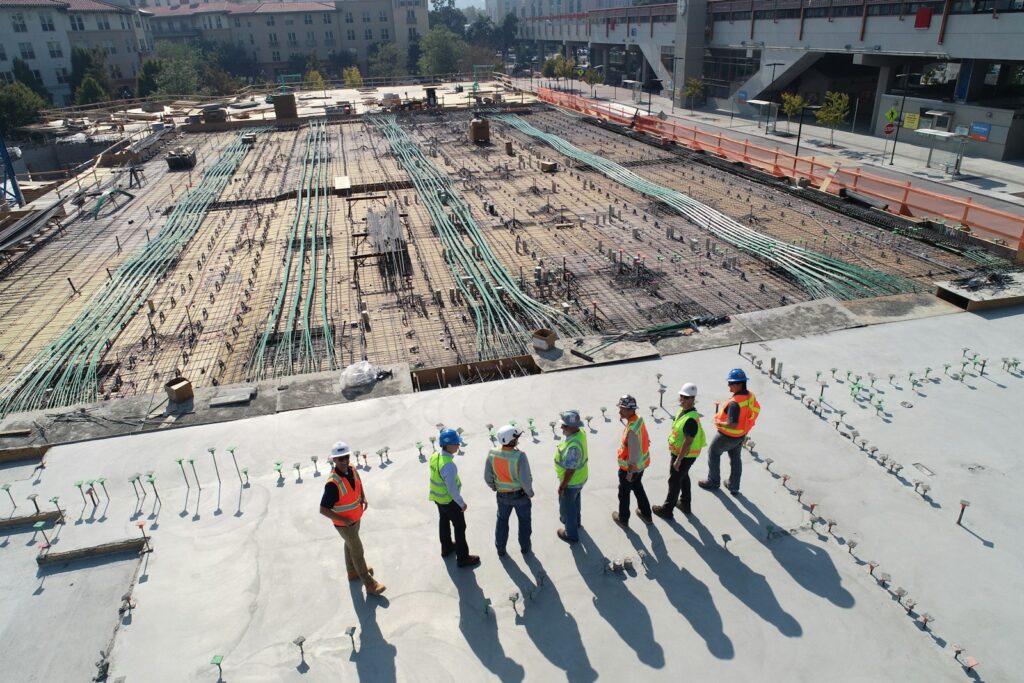What does a civil engineer do?
Civil engineering is one of the oldest and most crucial professions in the world, shaping the physical infrastructure we rely on every day through building and infrastructure projects. From highways and bridges to skyscrapers and water treatment plants, civil engineers play a vital role in constructing the environments where we live, work, and play.
But what does a civil engineer actually do day-to-day? If you’re a property or real estate developer, understanding the scope of their work is essential for seamless collaboration on infrastructure and building projects.
This guide explores the world of civil engineering, covering their roles, skills, and specializations while providing insight into how they contribute to successful construction projects.
What is Civil Engineering?
Civil engineering is a professional discipline focused on the design, construction, and maintenance of infrastructure that serves the public and private sectors. It’s a broad field that encompasses a variety of specialties and applications, from transportation systems to urban development projects.
Why Are Civil Engineers Important?
Civil engineers plan, design, and supervise infrastructure projects to ensure they are safe, efficient, and sustainable. They solve complex problems related to land use, materials, and environmental impact.
Above all, their commitment is to create structures that meet regulatory guidelines and serve community needs while remaining cost-effective.
Areas Where Civil Engineers Excel
- Planning sustainable infrastructure projects.
- Designing buildings, bridges, and transportation networks.
- Monitoring construction sites to ensure projects comply with safety and budgetary constraints.
- Advancing innovations in construction materials and technologies.
- Demonstrating strong organizational skills for monitoring and evaluating work at job sites.
Core Applications of Civil Engineering
Civil engineering straddles both private and public projects. This means civil engineers may work on initiatives ranging from municipal water systems to private real estate developments, making them indispensable in nearly every construction endeavor. State and local governments are significant employers of civil engineers, providing numerous opportunities in public infrastructure and engineering services.
Types of Civil Engineering Specialties
Civil engineering offers a wide array of specializations, allowing professionals to focus on specific segments of infrastructure and project needs. Obtaining credentialing in a civil engineering specialty is crucial for professional advancement, as it signifies expertise and can lead to senior technical or managerial roles.
1. Structural Engineering
Structural engineers design and analyze the load-bearing capacity of buildings, bridges, and other projects. They ensure safety and reliability while optimizing material use, guaranteeing that structures withstand natural forces like wind or earthquakes. Engineering mechanics is a crucial component of civil engineering education, preparing students for various specialties within the field.
2. Geotechnical Engineering
Geotechnical engineers study soil and building materials to assess their suitability for construction. They analyze land properties, recommend foundations, and mitigate risks such as landslides or soil erosion.
3. Environmental Engineering
Environmental engineers focus on sustainable practices, minimizing environmental impacts, and ensuring compliance with environmental regulations. Their projects might include water purification systems, waste management plans, and green building initiatives.
4. Transportation Engineering
Transportation engineers design and maintain systems such as roadways, bridges, railways, and mass transit systems. They ensure designs promote traffic flow, safety, and durability.
5. Coastal and Hydraulic Engineering
These engineers address challenges related to water systems, including flood control, dam construction, and coastal defenses, ensuring water structures serve long-term human and ecological needs. Coastal engineering is a specialized field within civil engineering that focuses on these challenges, providing expertise in managing and protecting coastal areas.
6. Construction Engineering
Construction engineers focus on the planning, management, and execution of construction projects. They ensure that projects such as buildings, roads, and infrastructure are completed on time, within budget, and adhere to safety and quality standards. These engineers bridge the gap between design and practical implementation, coordinating with various teams to bring designs to life efficiently.

Photo by Scott Blake on Unsplash
What Does a Civil Engineer Do?
Duties civil engineers typically handle are in various environments and conditions, from project planning in office settings to on-site supervision at construction sites. Here are the key aspects of how civil engineers work.
Designing Infrastructure
Civil engineers develop designs for a building or infrastructure project that meet both functional and aesthetic goals. Using tools like Computer-Aided Design (CAD) software, they create blueprints while considering factors like safety requirements and project feasibility. Creativity and critical thinking are essential in developing solutions for complex infrastructure projects, ensuring that challenges during the design and construction phases are effectively addressed.
Project Management
Project management is a major aspect of civil engineering. Engineers must plan out timelines, allocate budgets, and manage resources effectively. They also support preparing detailed cost estimates and risk analyses while ensuring projects comply with regulations.
Building and Maintenance
Civil engineers often oversee construction sites to ensure designs are implemented correctly. They focus on durability and long-term maintenance, making sure structures remain functional across decades.
Team Collaboration
Civil engineers frequently collaborate with other stakeholders, including architects, contractors, environmental scientists, and government agencies. This teamwork is vital to bringing concepts to life seamlessly.
Economic Feasibility
During each stage of a project, civil engineers analyze economic trade-offs to keep construction costs reasonable without sacrificing quality or safety.
How to Become a Civil Engineer
If you’re interested in pursuing a career in civil engineering or hiring one, obtaining a bachelor’s degree in civil engineering or a related field is a crucial step, as it provides valuable insights into their expertise.
Education Requirements
To become a civil engineer, a bachelor civil engineering degree or civil engineering technology is essential. Accredited programs, such as those approved by ABET, ensure students receive rigorous training in engineering principles.
Licensure and Certification
Many civil engineers pursue licensure as professional engineers (PE). This involves gaining work experience, passing the Fundamentals of Engineering (FE) exam, and later passing the Principles and Practice of Engineering exam. Licensed engineers, called professional engineers, can take on greater responsibilities and authority, including overseeing projects and providing services to the public.
For senior roles, licensure often becomes non-negotiable, especially for supervisory or administrative positions.
Gaining Practical Experience
Hands-on experience is invaluable for aspiring civil engineers. Internships, co-op programs, or early roles as engineer interns under supervision offer exposure to real-world challenges. Licensed civil engineers often oversee the work of other engineers and manage projects, providing guidance and ensuring quality standards are met.
Continuing Education
Civil engineering is an evolving field. Continuing education is crucial for engineers who want to stay up-to-date with emerging materials, designs, and technologies while bolstering their career prospects. Obtaining a graduate degree, such as a master’s or a Ph.D., is essential for enhancing qualifications and pursuing more advanced engineering careers.

Photo by ThisisEngineering on Unsplash
Technical Skills Required
Civil engineers need a mix of technical skills to deliver on complex projects effectively.
- Proficiency in CAD Software to create detailed designs and layouts.
- Strong Math and Science Knowledge including physics and materials science.
- Environmental Expertise to design sustainable solutions.
- Surveying and Geographic Information Systems (GIS) to establish building locations and align with local guidelines.
Obtaining the Professional Engineer (PE) license is crucial for career advancement, allowing civil engineers to assume greater responsibilities for public projects and seek senior management positions.
They also rely on data from survey reports, hydraulic systems, and water flow models to refine project designs and ensure that proposed buildings meet regulatory standards.
Sustainability and Environmental Considerations
A growing focus on green infrastructure means civil engineers must incorporate sustainable practices into project designs. Additionally, civil engineers are involved in organizing permit applications to ensure projects meet necessary regulations.
Environmental Impact Assessments
Assessing potential environmental impacts from air and water pollution is now part and parcel of project planning. Civil engineers strategize ways to limit these impacts while aligning projects with environmental regulations.
Green Initiatives
Sustainable infrastructure plans include green roofs, leaner construction materials, and energy-efficient designs. Incorporating long-term sustainability assessments ensures compliance and benefits the planet.
Why Developers Need Civil Engineers
For property developers and real estate professionals, civil engineers are key collaborators in bringing ideas to life. Their ability to translate concepts into tangible, efficient, and cost-effective results can make or break a project’s success. They also reduce risk by ensuring projects comply with safety regulations and codes. Civil engineers often engage with project managers to navigate bureaucratic processes and ensure projects adhere to safety and environmental standards.
Whether you’re planning a residential complex, a bridge, or a water systems framework, the support of a skilled civil engineer can provide unmatched value.

Photo by ThisisEngineering on Unsplash
Elevate Your Next Project with Expert Civil Engineers
Civil engineers are the unsung heroes behind every meticulously designed and reliable structure. Their understanding of materials, economy, and sustainability plays a vital role in developing our surroundings while ensuring durability and compliance. Federal government agencies also constitute a significant area of employment for civil engineers, alongside engineering services and state and local governments.
If you’re looking for engineering services or need experts to help guide construction, manage costs, and optimize your projects, we’re here to help. Learn more about our services today and discover how our team can elevate your next project.
View Our Work
Aspen Dental
Partnering with The Aspen Group on the construction of a new Aspen Dental facility that’s functional & welcoming for patients & staff alike. South Coast Improvement Company was awarded the construction of a new Aspen Dental facility in Killingly, CT. The...
Springhouse Senior Living – HumanGood
Designed to enhance comfort & functionality. South Coast Improvement company was hired by HumanGood for an interior and exterior renovation at Springhouse Senior Living. Our skilled teamtransformed the 2nd through 5th floor common areas into brighter, more...







